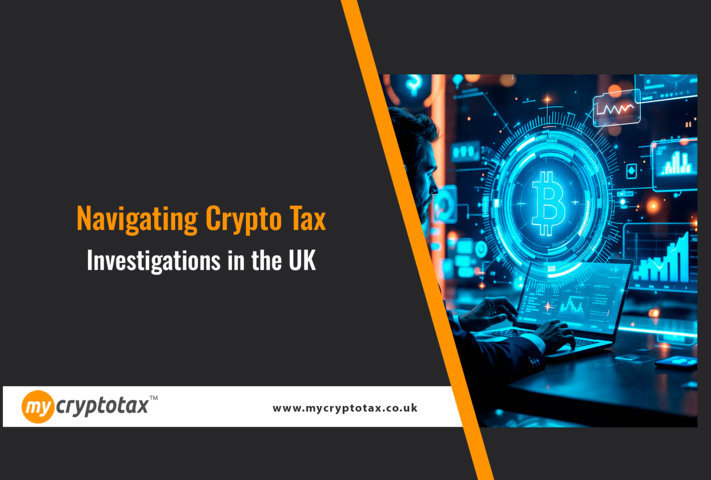Navigating Crypto Tax Investigations in the UK

Cryptocurrency tax compliance has become a growing focus for HMRC, with increased scrutiny on crypto investors and traders. This blog explores key aspects of crypto tax investigations in the UK, including voluntary disclosure, Contractual Disclosure Facility (COP9), and Code of Practice 8 (COP8).
Understanding Crypto Tax Investigations
HMRC’s interest in cryptocurrency transactions has grown as the market expands. With data-sharing agreements and advanced analytics, HMRC can identify discrepancies in tax filings. Crypto investors must be aware of their obligations and the potential consequences of non-compliance.
Voluntary Disclosure: A Proactive Approach
Voluntary disclosure allows taxpayers to correct their tax affairs before an investigation begins. Benefits include:
- Reduced Penalties: Penalties are typically lower for those who come forward voluntarily.
- Avoiding Criminal Prosecution: Prompt disclosure can prevent escalation to criminal proceedings.
- Simplified Resolution: Voluntary disclosure often results in a quicker, less adversarial process.
How to Make a Voluntary Disclosure:
- Gather Records: Compile all relevant documents, including transaction histories and wallet details.
- Calculate Liability: Determine unpaid taxes, interest, and potential penalties.
- Submit to HMRC: Make a full disclosure and make an offer offset the discrepancies and settle outstanding amounts.
![[Tags] double-exposure-creative-bitcoin-symbol-with-modern-laptop-background-cryptocurrency-concept-1-e1736788074743 Navigating Crypto Tax Investigations in the UK](http://mycryptotax.co.uk/wp-content/uploads/2025/01/double-exposure-creative-bitcoin-symbol-with-modern-laptop-background-cryptocurrency-concept-1-e1736788074743.jpg)
Code of Practice 9 (COP9) The Contractual Disclosure Facility (CDF)
HMRC will issue cop9 notice advising they are looking into suspected deliberate or fraudulent conduct by the tax payer, they will offer the taxpayer the opportunity to make an outline disclosure using the CDF facility
COP9 is offered when HMRC suspects serious tax fraud. Under this process, individuals can:
- Admit to Tax Fraud: By signing the Contractual Disclosure Facility, taxpayers acknowledge deliberate non-compliance.
- Avoid Criminal Prosecution: Full cooperation and disclosure typically protect individuals from criminal charges.
- Provide a Detailed Report: A full disclosure report must outline all tax irregularities.
Key Steps in COP9 Investigations:
- Engage a tax advisor experienced in HMRC investigations.
- Review all financial activities comprehensively.
- Cooperate fully to avoid harsher penalties or criminal referrals.
Comparing Voluntary Disclosure and Contractual Disclosure (COP9)
While both voluntary disclosure and COP9 involve rectifying tax irregularities, they differ significantly in purpose and application:
| Aspect | Voluntary Disclosure | Contractual Disclosure (COP9) |
| Trigger | Initiated voluntarily by the taxpayer before HMRC intervention. | Offered by HMRC when they suspect serious tax fraud. |
| Purpose | To rectify unintentional errors or omissions in tax filings. | To address deliberate tax fraud. |
| Legal Protection | Reduced penalties; avoids criminal prosecution. | Protects against criminal prosecution if fully cooperative. |
| Process | Simpler, using the Digital Disclosure Service. | Involves signing a contractual disclosure and providing a detailed report. |
| Scope | Addresses errors, omissions, and minor discrepancies. | Targets serious and deliberate non-compliance. |
| Penalty Severity | Lower penalties for voluntary and prompt disclosure. | Potentially higher penalties but avoids criminal charges with cooperation. |
![[Tags] double-exposure-creative-bitcoin-symbol-with-modern-laptop-background-cryptocurrency-concept-1-e1736788074743 Navigating Crypto Tax Investigations in the UK](http://mycryptotax.co.uk/wp-content/uploads/2025/01/bitcoin-coin-showing-cryptocurrency-as-digital-assets-1-e1736788002389.jpg)
Core of Practice 8 (COP8) Suspected Deliberate or Fraudulent Conduct.
COP8 investigations target suspected tax avoidance rather than fraud. This could involve:
- Complex Tax Schemes: HMRC may investigate arrangements perceived as avoiding tax liabilities.
- Undeclared Overseas Assets: Crypto held abroad is a common focus area.
- Unreported Gains: Significant discrepancies in declared and actual gains from crypto transactions.
Responding to COP8 Investigations:
- Provide all requested documents promptly.
- Clarify the purpose of complex transactions or arrangements.
- Seek expert advice to navigate the technicalities of the investigation.
Best Practices for Crypto Tax Compliance
- Maintain Comprehensive Records: Record all transactions, including trades, staking rewards, and mining outputs.
- File Accurate Returns: Ensure all crypto-related income and gains are reported.
- Seek Professional Advice: Consult a crypto tax specialist for guidance on complex scenarios.
Partner with MyCryptoTax for Expert Guidance
At MyCryptoTax, we specialize in helping UK crypto investors navigate tax investigations and compliance. Our services include:
- Assistance with voluntary disclosures and COP9 investigations.
- Representation in COP8 inquiries.
- Strategic advice to minimize liabilities and penalties.
Conclusion
Crypto tax investigations can be daunting, but proactive measures and expert advice can make all the difference. COP8 and COP9 are issued by HMRC only when they have sufficient information to suspect significant tax irregularities. These investigations can be extensive, so these codes are reserved for cases that HMRC believes will be worth their time. By understanding voluntary disclosure, COP9, and COP8, UK crypto investors can navigate these challenges with confidence.
FAQ’s
Can I avoid penalties by making a voluntary disclosure?
Yes, voluntary disclosure typically results in reduced penalties compared to being caught during an investigation. It also helps avoid criminal prosecution if the disclosure is made before HMRC contacts you.
How can I ensure compliance with HMRC’s crypto tax rules?
To stay compliant, maintain detailed transaction records, report all crypto-related income and gains accurately, and seek advice from a crypto tax specialist to handle complex situations.
![[Tags] double-exposure-creative-bitcoin-symbol-with-modern-laptop-background-cryptocurrency-concept-1-e1736788074743 Navigating Crypto Tax Investigations in the UK](http://mycryptotax.co.uk/wp-content/uploads/2023/12/1-edited.png)
DISCLAIMER
© My Accountancy Team 2024 All Rights Reserved – The above articles are provided for guidance only and may not cover your personal circumstances so you should not rely on them. It is important that you seek appropriate professional advice which takes into account your personal circumstances where you can provide the full facts of the case and all documents related to your case. My Accountancy Team Ltd t/a mycryptotax.co.uk, cannot be held responsible for the consequences of any action or the consequences of deciding not to act.
![[Tags] double-exposure-creative-bitcoin-symbol-with-modern-laptop-background-cryptocurrency-concept-1-e1736788074743 Navigating Crypto Tax Investigations in the UK](http://mycryptotax.co.uk/wp-content/uploads/2023/12/2-1-1024x390.jpg)
Do you have a question for our experts?
If there’s cryptocurrency tax issue that has you puzzled or worried, get in touch. Everyone on our team loves to talk, especially when it helps people like you find peace of mind.
Schedule a free consultation with one of our Crypto Tax Experts and get your questions answered fast!
